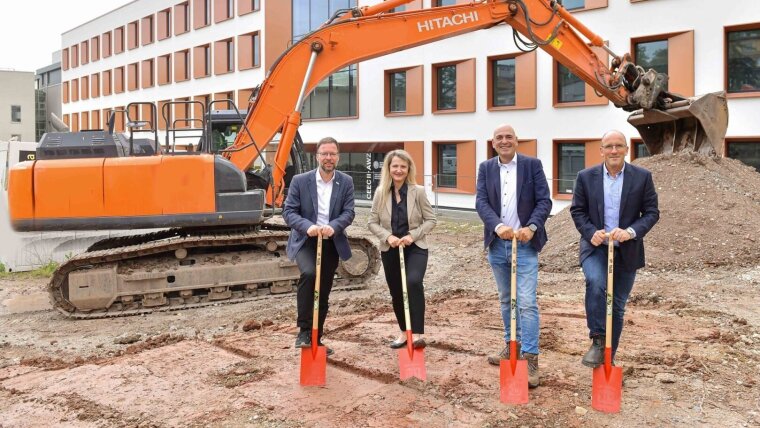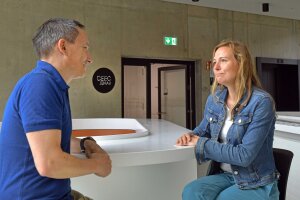
- Light
- Knowledge Transfer and Innovation
Published: | By: Axel Burchardt
Experienced founder Dr Marc Lehmann from SmartDyeLivery advises Dr Stephanie Schubert from the start-up project "Next Generation Pharma Polymers".
Image: Jürgen Scheere (University of Jena)In addition to the support provided by the Service Centre for Research and Transfer, there is now another concrete spatial perspective for those looking to start a business at Friedrich Schiller University Jena: construction work has just begun on the new "lab2fab" start-up centre on the university's Landgrafen Campus. The Technology and Innovation Park (TIP) Jena is erecting a 4,680 square metre building here by the end of 2025, which will prepare young high-tech companies for the market.
"Transfer and start-up centres connect university research with regional, sometimes even supra-regional industrial companies. They accelerate the transfer of scientific findings into the economy, thus creating new products and jobs," says Beate Wachenbrunner, Plant Manager of the municipal real estate company Kommunale Immobilien Jena (KIJ) and acting Managing Director of TIP Jena.
"With the university and the natural science institutes, above all the Center for Energy and Environmental Chemistry Jena (CEEC) and the Jena Center for Soft Matter (JCSM), we have great potential in Jena, especially in the field of polymer science, which undoubtedly justifies an investment of 21 million euros. This will further enhance our city as a centre of science", says a delighted Lord Mayor Dr Thomas Nitzsche.
Translating environmentally relevant research into sustainable products
The emerging start-up centre rounds off the construction projects at CEEC Jena, where an application centre has been built alongside three research buildings. Research into energy storage of the future, clean water for all, recycling and many other (environmentally) relevant topics as well as medical and pharmaceutical-related projects is running at full speed. The first prototypes or small series of products are being created in the application centre, proving that the ideas can be put into practice. "In future, the new start-up centre will enable interested parties in close proximity to research to set up companies that transfer these research products into commercial practice; from the laboratory directly into fabrication," says interim University President Prof. Dr Georg Pohnert, alluding to the building's title "lab2fab".
Examples of this are the companies Next Generation Pharma Polymers (NGP Polymers GmbH), which develops new pharmaceutical polymers for future drug formulations, and linkdlab GmbH, a Chemistry AI start-up. Both are still housed in university buildings.
In addition to the spin-offs, lab2fab will also provide space for the new Helmholtz Institute HIPOLE Jena. This joint institute of the Helmholtz-Zentrum Berlin (Helmholtz Centre for Materials and Energy, HZB) and the University of Jena is researching new polymer materials for energy applications. Furthermore, premises are planned for a proposed transfer centre for sustainable polymers.
"Even if the current founders still have to be accommodated in other buildings, there is a concrete perspective for the future. And I am sure that this will also encourage other researchers to transfer their inventions to industry," says Prof. Dr Ulrich S. Schubert.
The fact that productive companies have already emerged from the scientific environment in the Landgrafen area is demonstrated, for example, by Polytives and SmartDyeLivery. They develop polymer additives and active pharmaceutical ingredients with polymer materials, respectively.
